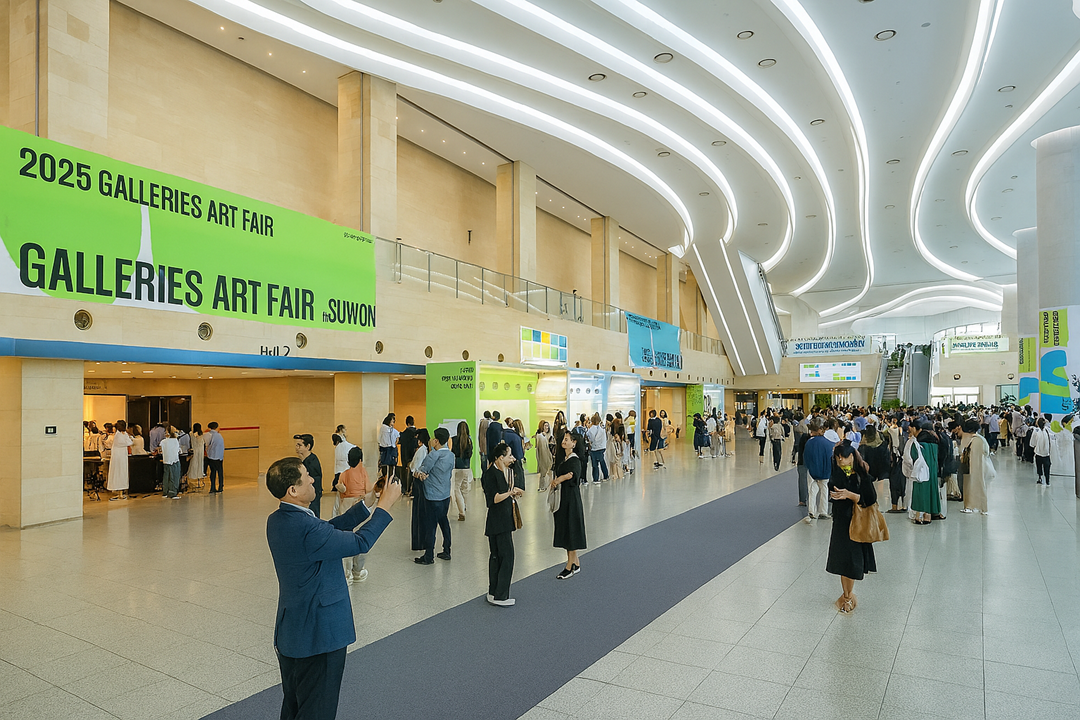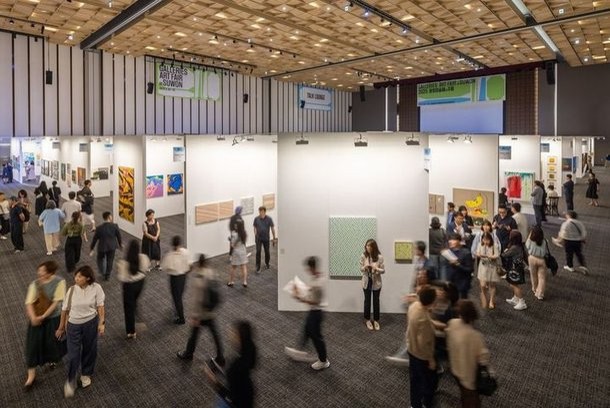The
longest-running art fair in Korea, the Galleries Art Fair, returned to Suwon
for the second consecutive year, reaffirming the growing potential of the
contemporary art market in the southern metropolitan area. Held from June 26 to
29 at the Suwon Convention Center (SCC), the 2025 edition welcomed over 33,000
visitors—an increase of more than 10% compared to the previous
year—underscoring Suwon’s rising status as an emerging hub for contemporary art
distribution.

2025 Galleries Art Fair in Suwon – Exhibition View / Photo: Newsis
This
year’s fair featured 104 top-tier galleries affiliated with the Korea Galleries
Association, presenting works by more than 600 artists, ranging from emerging
talents to established masters. Young artists such as Yoon Widong, Shin Jia, Oh
Yubin, Jung Sooyoung, and Jenny Park garnered significant attention, while
works by mid-career and blue-chip artists like Chae Sungpil, Lee Kangso, and
Kwak Hoon also enjoyed sustained popularity.
A
notable trend was the strong turnout of young families, including new
collectors from the Gwanggyo New Town area who actively purchased moderately
priced artworks. The fair’s focus on representing exclusive artists, along with
accessible pricing strategies and inclusive programming, effectively lowered
the barriers to art collecting and broadened audience engagement.

2025 Galleries Art Fair in Suwon – Exhibition Scene / Photo: Newsis
The
VIP and press preview day alone drew more than 4,700 visitors. Throughout the
four-day event, guided tours, art talks, and kids’ programs contributed to
longer visitor stays and deeper engagement. The docent program, organized in
collaboration with Art Salon Ogrim, sold out every session. Public lectures
such as “Demystifying Art Fairs,” “Tax Essentials for New Collectors,” and
“Understanding Korean Contemporary Art Through Keywords” were met with
overwhelming enthusiasm, often exceeding seating capacity.
Outdoor
events further enriched the visitor experience, expanding the ways in which art
could be enjoyed. “Galleries Night,” live jazz performances under the title
“Lake Vibe,” and a wine festival created a casual and festive atmosphere. Pet
stroller rentals also added to the fair’s accessibility, catering to visitors
with companion animals.
Locally
integrated programs stood out as well. A special exhibition titled 《Suwonjang: Your Landscape》, Your Taste, co-organized with the Suwon Cultural Foundation, offered local
artists the opportunity to connect with both gallerists and the public. The
children’s workshop Let’s Draw!—where kids crafted traditional Korean
moon jars by hand—proved especially popular with families.
The
impact of the event extended far beyond sales figures. According to the fair’s
organizing committee, “This year’s fair was more than just an exhibition or
market—it played a crucial role in cultivating a new art-buying demographic
centered in Suwon, while contributing to the long-term expansion of the local
cultural ecosystem.” They added, “The active participation of young collectors
drove sales of works that emphasized accessibility and practicality over
prestige, helping establish a sustainable base for the art market in southern
Gyeonggi Province.”
Lee
Seonghoon, Chairman of the Korea Galleries Association, commented, “Suwon is
emerging as a major cultural center in the southern capital region. This fair
helped foster an environment where contemporary art can be appreciated as a
close and everyday part of life.”
By
offering a concrete model for expanding Korea’s art market beyond Seoul, the
‘2025 Galleries Art Fair in Suwon’ presented a new direction for art fairs in
the country. Whether this momentum can be sustained and extended to other
regions remains to be seen—but Suwon is already showing signs of becoming a
strategic anchor for the future of Korea’s regional art scene.































